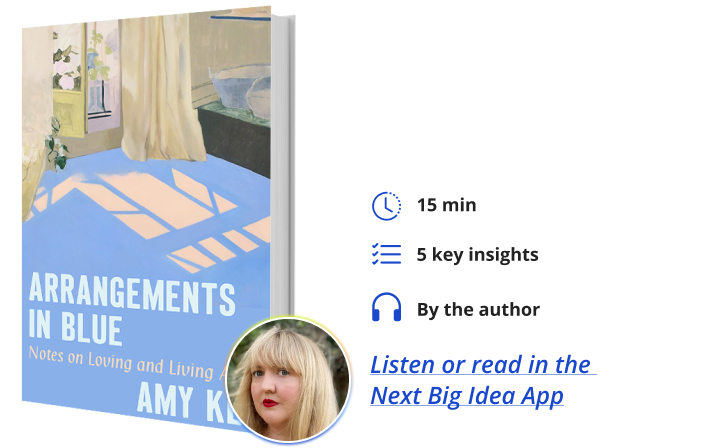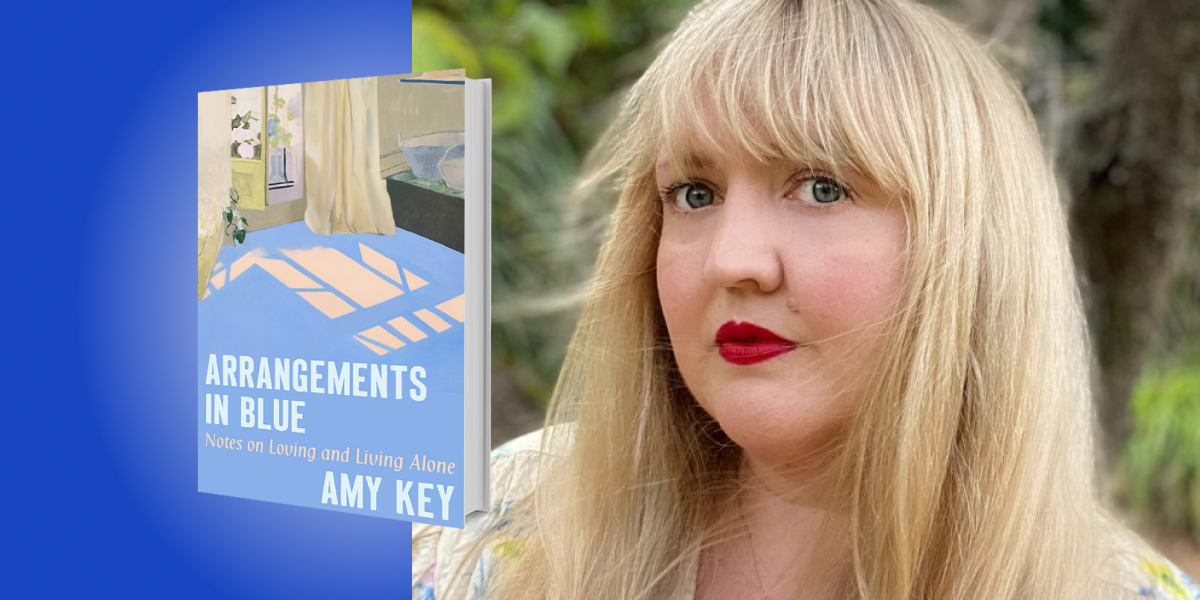Amy Key is an award-winning poet and writer. She is the author of two collections of poetry, Luxe and Isn’t Forever, which was a Poetry Book Society Wild Card Choice and a Book of the Year in the Guardian, New Statesman, and The Times. Her poems have been widely published and anthologized, and her essays have appeared in At the Pond, Granta, and The Poetry Review.
Below, Amy shares 5 key insights from her new book, Arrangements in Blue: Notes on Loving and Living Alone. Listen to the audio version—read by Amy herself—in the Next Big Idea App.

1. If you want to love yourself, start by being your own best friend.
The rhetoric that you must love yourself before you can expect anyone else to love you can feel like a terrible burden. Aren’t we all deserving of love, even when we might struggle to love ourselves? I think so. Do we think less of the people we love when they’re feeling bad, or down on themselves? I don’t. Instead, I wish they could look at themselves through my eyes. I wish they could talk to themselves like they would talk to me if I were similarly despondent and self-critical.
I’ve fought with a sense of failure about my inability to “love myself” all my life. Recently, though, I’ve come to think that rather than setting the bar at something as rarefied and fraught with failure as love, we should aim instead to be a good friend to ourselves. We should speak to ourselves as a friend might, borrow our friends’ eyes when we look in the mirror.
Look at your phone’s camera roll and find a photo of yourself you don’t like. Then ask yourself, what would my best friend say about me in this photo? Would she like that I am smiling? Does it remind her of a memorable day we spent together? Does she know that I am sad in this photo, and she wants to give me a hug? Try this, and see if you feel differently about the photo, and yourself afterward.
2. There’s more to celebrate than births, engagements, weddings, and anniversaries.
In white, western, heteronormative cultures, we’re schooled from birth that the most important things we’ll achieve post-education are a house purchase, marriage, and becoming a parent. If those things aren’t on the agenda for you, when do you get to have a special occasion, when do you get to issue fancy invitations and ask your community of family and friends to make time to celebrate with you?
“The people who love you want to share in what is important for you, they want to celebrate it and be invited in.”
This ability to take stock of one’s life, and to note the progression from here to there, are important ways our lives can take shape. In my experience, there’s been a sense of shame in making a fuss of and asking people to prioritize milestones in my life that are personally significant. This is because the culture I live in doesn’t qualify them as worthy of a collective investment. But when I’ve chosen to mark an occasion—a big birthday, a book launch for example—and asked people to join me in it, they’ve responded with enthusiasm and joy.
The people who love you want to share in what is important for you, they want to celebrate it and be invited in. I recently went to a grand celebration a friend held to mark a medical procedure being completed, replete with a themed cake! Waiting for births, weddings, and funerals limits both our opportunities for collective memory-making and our sense of what makes a life meaningful.
3. Romantic love isn’t a universal human experience, but that can be OK!
In Western culture, it is assumed that one day you will fall in love and decide to couple up with someone. It is seen as an inevitability that you will “find someone,” you just need to “put yourself out there” in the dating marketplace, even if it takes a long time to “find the one.”
“Political, social, cultural, and economic domains are structured for heteronormative relationships.”
Opting out of romantic love is tolerated only when there’s a calling from a higher power. But some people for reasons they aren’t ever able to understand, don’t find romantic love. The expectation that they should have and have somehow failed can result in them feeling excluded from life because life is designed for pairs. Political, social, cultural, and economic domains are structured for heteronormative relationships. If you find yourself untethered, romantically speaking, there isn’t really a place for you.
Women in particular are given derogatory labels—spinster, crone, cat lady. It is assumed that their experience of life is sad and small. What I’ve found is that life without romantic love can be a really good life—as full of meaning and opportunities for pleasure, comfort, security, fun, and peace as a partnered one. Knowing this means I’m not fearful of being alone, now, or in the future. That’s not to say it is or will always be easy. If we were all less frightened of being alone, the quality of all our relationships, especially the romantic ones, would deepen and grow.
4. Build a life around what’s in it, not what isn’t.
It took me a long time to realize that I had been shaping my life around an absence. Not like how a tree might grow into a fence, incorporating the fence into its own growth, but more like building my house across a canyon, its structural integrity permanently at risk.
“When I paid attention to presence rather than absence, I found love was abundant, and this was transformative.”
I lived for years with a sense I was in a kind of temporary state—singleness, childlessness—and life would begin in earnest once I’d found my person and made a start through life’s official transitions. I focused more on what was not there than what was. When I paid attention to presence rather than absence—the intimate relationships I’d nurtured, the home I’d created, the way I could stretch the idea of mothering to take in my interpretation of it—I found love was abundant, and this was transformative.
5. Hierarchy is at odds with love.
If we place romantic love at the center of life and designate it Top Cat of loves, might we not be consigning people who don’t “achieve” it to failure and dismissing their life experiences? This also may cause us to dismiss the other ways love can be created, shared, and valued in our lives. These other loves can be found in communities, in collaboration, and in friendships and families we are born into or invent for ourselves.
The more I’ve thought about love, the more I’ve come to believe that any kind of hierarchy undermines love’s purpose. In one of the songs on Joni Mitchell’s album Blue, she sang that jealousy and greed “undoes” all the joy that could be. If we fixate on romantic love as the pinnacle of life, and we obsess over its absence, we’re less open to the connections, care, and soulful inquiry that love in all its forms might offer us.
To listen to the audio version read by author Amy Key, download the Next Big Idea App today:































